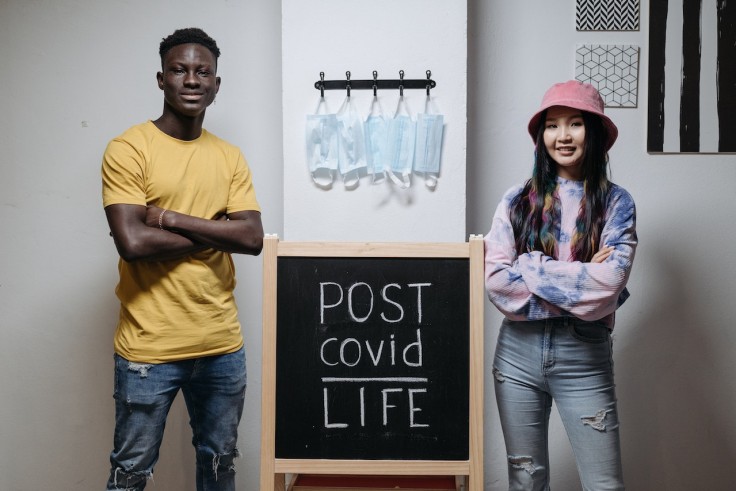
What does parenting look like in a post-pandemic world?
Should parents be worried especially with the daunting news that seems to keep on materializing in this post-pandemic times?
The Nation's Report Card revealed that math and reading proficiency levels among 4th and 8th graders across the nation has dropped abruptly from 2019 to 2022. In 2021, according to Chalkbeat, graduation rates in high school plunged in almost half of the states in America. And, recently in October, health experts encouraged children from ages 8 to 18 years old to undergo routine screening for anxiety when they visit their doctors.
Licensed clinical psychologist and assistant professor in Tufts' Eliot-Pearson Department of Child Study and Human Development, Eileen Crehan, proclaimed that parents need to be worried enough to be aware of what is happening, but not "outrageously worried," as there are things that they can do to help their children.
She continued to declare that the world cannot deny the negative effects from the pandemic, yet many of these are "unlikely to persist." The fact that everyone in the nation, and the world had almost the same experiences over the past few years is significant, especially that kids affected are within age ranges, there is "is developmental consistency."
What parents can do to
Crehan told Tufts Now that there are steps that parents can take to help their children and teenagers, who are going through social, emotional, or academic struggles.
Here's her advice on how parents can effectively help the children transition from pandemic living to the current period.
1. Parents need to talk about it so that they can model talking about it to their children.
Due to a long period of no social interaction, people are still uncomfortable with the social aspects of their lives. Crehan said that even her college students are groping with uncertainty. Thus, how much more these children and teenagers who lack experience with small, daily interactions.
One effective way to help these kids overcome social anxiety or uncertainty is to get them talking and opening up about it. And, how can parents do this? Parents should model talking about it themselves. Start the conversation and say that adults are also finding it hard to socialize these days.
2. Parents should be aware how small things are much more effective than doing something huge.
Start small and control the urge to counter the pandemic effects by going big with social events. Progress is better when small, sure steps are taken. Instead of throwing parties or doing large-group playdates, why not start with one-on-one moments with friendsYou might have an urge to counter the effects of the pandemic years by going big with social occasions. But it's better to progress bit by bit. Rather than throwing parties or lining up large-group playdates, start with arranging for one-on-one time with a peer or even just a playground outing that allows your kid to be in a group while not necessarily interacting directly with others.
"Your children just might not be ready yet for the stimulation of a big group. That doesn't mean they won't ever be. Letting children engage with others in contained and controlled ways until they are ready will lead to more effective adjustment," Crehan suggested.
3. Parents need to understand social media, and not be biased on its downsides.
Social media is not all negative. It exists and can be utilized to build relationships between kids. They can use it to connect to one another, and this can be a good help as they slowly start interacting.
Crehan recommended that to ensure safety, parents should use the same app or tools they are using to both keep an eye on them and to be aware of what's happening with them.
Read Also: Reading Skills Among First Graders Significantly Declining Due to the Pandemic
4. Parents need not be intimidated with anxiety screenings. In fact, they need to follow up on it.
According to Crehan, the anxiety screening, though it was giving chills and worries to some parents, is actually a step in the right direction, because the kids might really need it. Thus, it is very crucial for parents to follow up and be aware of the results so that together, parents and child, can start on the healing process.
5. Parents may consider evidence-based therapies like group interventions.
Crehan advised parents to not shy away from these kinds of therapies. Group setting enables participants to learn from each other, and group therapy settings offer a safe place for these children, with structured programs that will help them ease back in social situations.
Evidence-based programs like Facing Your Fears For can cure the anxiety that young people get from socializing through cognitive behavioral approach.
6. Parents can also consider hiring tutors for their children.
If children's grades are lower as well as their self-esteem, Crehan, a mental health professional, suggested that getting a tutor for them is the way to go. A tutor can be an additional support to not only rebuild their confidence, but also be better in their academics.
But parents should be reminded that the pandemic has really been stressful for the kids, and the transition to online class might have been more stressful. Thus, there are more important things to take care of like their mental health.
Related Article: Latest Parenting Books Help Parents Understand Kids Better in Social Media, Post-pandemic Realities